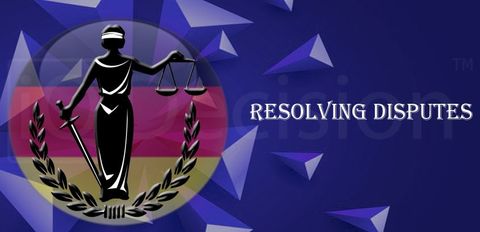Planning on registering a company in the state of Germany? Want to know more about resolving disputes in the state of Germany? This article will provide you with an indepth look at German court system.
Courts
Disputes centering around civil and commercial disagreements get adjudicated by regular courts. All regular courts, excluding the Federal Court, are organized uniformly and in strict compliance with federal legislation.
District courts handle minor lawsuits, while regional courts deal with appeals against decisions made by district courts. The Federal Court plays the role of a supreme judicial authority in all civil lawsuits, as well as renders decisions on subsequent appeals.
Some courts in the regions are exclusively authorized to handle specific lawsuits, such as those pertaining to medicine, banking, insurance, etc.
For example, a court in Düsseldorf specializes in IP disputes and is considered Europe’s number one venue in terms of patent litigations. It handles nearly 50% of all lawsuits in the EU..
Court Composition
Members of a special commission select adjudicators from amongst the best and most qualified candidates. All of them are held in high esteem and considered incorruptible.
German civil courts have no no jurors. Courts in the regions have collegiums made up of 1 judge & 2 jurors that handle commercial matters.
Procedure for International Conflict Resolution
On average, the timeframe for filing a civil lawsuit is 3 years. It is counted from the moment the lender learns or is notified of the lawsuit and plaintiff. All claims are declared null and void after a period of ten to thirty years, regardless of whether the lender knows about that or not. The parties can reach an agreement on extending the deadline, but by no more than 30 years.
Germany has no pre-trial investigation, disclosure and pre-trial procedures. The disclosure requirement provides stakeholders with a right to verify companies’ accounting records.
Counsellors handle lawsuits based on the already available data or seek to obtain supplementary data by checking state registrars and exploring different types of media.
Those wishing to settle a financial dispute need to keep in mind this:
- If while a trial is ongoing it turns out that the defendant resides elsewhere and speaks no German, the plaintiff may be asked to pay for having all the required documents translated;
- Defendants are required to respond to claims within 14-28 days;
- The court uses its own discretion to determine the schedule of the hearing. The parties may, however, request for an extension of the dispute settlement or the adjournment of the hearing;
- Concealing or destroying proof is considered an offense but only in the event a 3rd party is entitled to access the said evidence. While resolving a dispute, German courts may require one of the parties to provide for its consideration material evidence, such as photographs;
- Settling a dispute in the state of Germany provides witnesses with certain privileges: if a lawyer plays the role of an attorney, he may decline to give testimony without prior consent of his clients;
- As far as commercial lawsuits are concerned, courts can only rely on evidence provided by both parties. Witnesses get interrogated orally. If need be, courts may enlist experts that will help establish the facts. Public may be allowed to attend the hearings;
- The “no-win-no-fee" or "success-fee" contracts are explicitly prohibited;
- Settlement of a financial dispute envisages reimbursement of additional interest before the legal costs are covered.
Remedies
Procedure for international dispute resolution in Germany enables parties to take advantage of such temporary remedies as immobilizing defendant’s assets and protecting all non-monetary claims regarding irreparable damage before a final decision is made).
Verdicts Handed Down by Courts Abroad
Verdicts handed down by EU, Swiss, Norwegian or Icelandic courts are recognized as per EU legislation.
Verdicts of US courts involving penalties are not enforceable because they are believed to be in violation of German legal system.
Obtaining Evidence
Under international law, German courts are obliged to:
- Provide evidence to courts in the EU (excluding Norwegian ones), and also, if necessary, abide by specific procedure;
- Observe the Hague Evidence Convention
Arbitration
- German arbitration legislation originates in UNCITRAL;
- 3 arbitrators must be appointed, one of whom will be chairman;
- Either of the parties may submit an application demanding removal of a judge within 2 weeks, as well as a second application within 1 month.
- Practicing lawyers, retired adjudicators and college instructors may often act as arbitrators.
- Lawyers may represent either of the parties
Other points that need to be kept in mind are:
- Arbitrators may provide interim remedies;
- Court jurisdiction and method for appointment of arbitrators may be appealed. Parties may also request temporary assistance;
- No deadline is established for awards;
- There is no appealing verdicts but they can get postponed;
- Losing parties are to reimburse legal costs to winning parties
Mediation
Conflict resolution through mediation is rare in Germany. However, mediator services are widely in demand in the building industry.
There are no strict requirements regarding mandatory peaceful settlement of conflicts. However, the plaintiff is required indicate in his statement whether such an attempt was made.
Also, mediation is not a requirement for consumers.
Legal Advice
If you have any questions regarding resolving disputes in the state of Germany, you should consider contacting IQ Decision UK. You can get a full range of consulting and support services, including conducting international negotiations, providing mediator services, resolving a conflict through arbitration and much more.

















